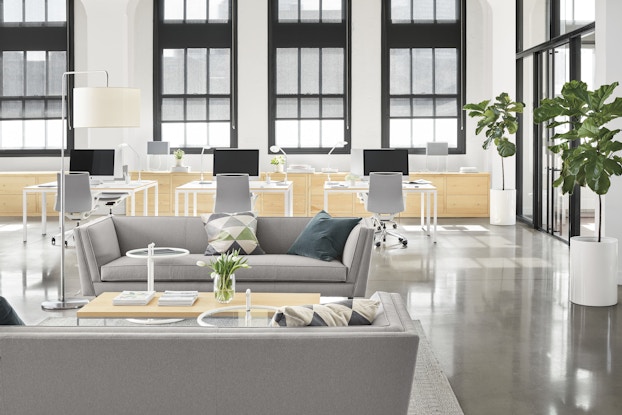
Minneapolis-based Room & Boardhas spent the last 35 years building a reputation for quality furniture, mostly designed and manufactured in the U.S., and a consumer-centric business model. Recently, the company launched Room & Board Business Interiors, a new take on the contract furniture model for clients decorating workplace, hospitality and other communal environments.
Though the company has always serviced a certain number of commercial clients, establishing it as a discrete part of the business became necessary as that number continuously rose. The growth of Business Interiors into its own dedicated division was natural, says Nicole Gaynor, Room & Board’s head of business interiors experience.
As she builds out a new team, Gaynor is on a mission to carry the 35-year-old company’s values into a new era where the boundaries between residential and commercial spaces are increasingly blurred, she told CO—.
It isn’t just us taking residential pieces and putting them out there. These are pieces that we’ve tested and we stand behind all of them.
Nicole Gaynor, head of business interiors experience, Room & Board
Trends
Room & Board rolled out Business Interiors to capitalize on the 'resimercial' trend — combining commercial and residential vibes in their furniture offerings. Read on for more business trends.
Industry trends meet the needs of multi-use spaces
Room & Board is capitalizing on a cultural moment where its specific design aesthetic happens to resonate with the masses and meet the needs of a consumer interiors industry in a state of flux.
“There is a shift toward workspaces and hospitality rooms to feel more like a home with nicer aesthetics and a more modern feel that is driving demand,” Cristina Fernandez, director and senior research analyst with Telsey Advisory Group (TAG), told CO—. “The incentive is to find alternative revenue streams beyond retail that can drive profitable sales growth.”
With coworking and remote working on the rise, and co-living uptrending, the definition of workplaces and meeting spaces and what they look like is changing rapidly. Further, there are a growing number of residential properties making the transition from traditional leasing or ownership to ad-hoc commercial usage, such as short-term vacation rentals or hosting private events and social clubs.
This trend towards “resimercial” (residential and commercial) design is having a growing impact on the home industry, as well as the lives of consumers across industries. “According to the data,” writes architect Donald M. Rattner, “people get more ideas at home or while engaged in activities associated with domestic life than at any other time or anywhere else … Viewed through the prism of these findings, it is understandable that building professionals like myself should turn to the residential sphere for guidance in shaping the innovation-driven workplace of today.”
“As the cities grow denser, no public space will have a single use,” Piers Fawkes, founder of research firm PSFK, predicts in a series on the future of living space. “Like city inhabitants themselves, they’ll be multifaceted and constantly changing, providing for the needs of thousands or even millions of visitors. We probably won’t mourn the loss of the living room — common areas in the cities of tomorrow will be our playgrounds instead.”

Adapting operations
These increasingly blurred lines between commercial and residential spaces provides a unique opportunity for a company like Room & Board to produce furniture that looks stylish and inviting but is resilient enough to withstand communal usage.
To generate success with Business Interiors, however, Room & Board had to adapt its business model to meet the needs of a wider array of customers. Contract furniture clients aren’t just architecture or design firms, or office managers, but also small business owners, sole proprietors and leaders of shared spaces.
The scale of production for commercial interiors differs from that of furniture for residential use, and an independent retailer could easily struggle to deliver on larger orders. Luckily for Room & Board, Gaynor claims, much of its existing merchandise assortment was able to pass the test and serve double-duty for both the residential side and Business Interiors. “It hasn’t been a big shift in terms of the way we look at pieces in the collection,” she says, “but essentially it’s just understanding what those [commercial] testing standards are.”
In some cases, items need slight modifications to make sure they really live up to commercial use, and Room & Board has been able to leverage strong, long-term direct relationships with its vendors to make it happen. With a self-reported 90% of its manufacturing partners located in the U.S., it is easier for the company to collaborate with its vendor and mill partners to make changes; meanwhile, manufacturers are close by when needed to fill larger orders.
“We knew we’d have to let people know that this is for real, for lack of a better way to say it,” Gaynor tells CO—. “It isn’t just us taking residential pieces and putting them out there. These are pieces that we’ve tested and we stand behind all of them.”
TAG’s Fernandez emphasized what it takes for a furniture brand to succeed across consumer and contract sales channels. “Above all, brands need to have a quality that corresponds with their price and be seen as a good value,” she says. "Other differentiating factors include good customer service, product durability and a commitment to sustainable sourcing … I think Room & Board offers high quality, modern furniture that supports its price and has driven increasing brand awareness.”

Courting contract clients with ‘quick ship’ delivery, personalized service
Business Interiors clients are offered a level of personalized service and delivery that Gaynor boasts is thus far unmatched in the industry.
“The customer and the relationship has always been the key to our success,” Gaynor said. “This is an extension of what we do with our residential customer, versus being a completely different piece of the business.”
However, Gaynor and her team also have to meet expectations of contract clients who are used to working with other, more established commercial interiors retailers. As expected elsewhere in the industry, commercial products now come with five- and ten-year warranties.
On the residential side, Room & Board does not offer a trade discount program for industry professionals, which means it may not be the first stop for architects and interior designers. To compete on the contract level, Gaynor says, the company developed a volume discount strategy that it offers in addition to its existing yearlong price guarantee.
Key to this customer-first service is a Quick Ship option. Contract clients have the same delivery options offered to residential customers, powered by Room & Board’s network of showrooms and in-house delivery team. A project coordinator works with each client from end to end, helping to ensure clients are satisfied and vendor partners are able to provide what’s required, even following up post-delivery to ensure they are satisfied.
“That’s an expectation of something a customer would want, whether it be residential or business,” Gaynor says. “And I think all our customers really appreciate the personal touch we’re able to provide.”
CO— aims to bring you inspiration from leading respected experts. However, before making any business decision, you should consult a professional who can advise you based on your individual situation.
Want to read more? Be sure to follow us on LinkedIn!
CO—is committed to helping you start, run and grow your small business. Learn more about the benefits of small business membership in the U.S. Chamber of Commerce, here.








